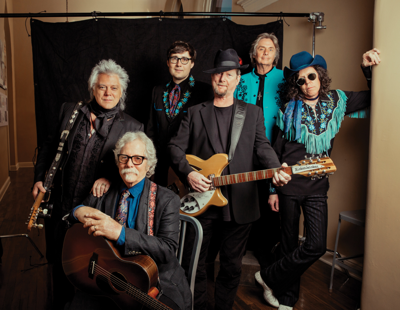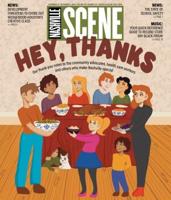
Roger McGuinn and Chris Hillman with Marty Stuart and His Fabulous Superlatives
The strange case of The Byrds’ 1968 country-rock album Sweetheart of the Rodeo cries out for the kind of revisionism that acknowledges the looming presence of politics in music. Cut in Nashville and Los Angeles during a fractious year in American history, Sweetheart of the Rodeo anticipated ’70s country-rock, which morphed into Americana 30 years later. It was, in every way, a political statement.
Dismissed upon release, Sweetheart of the Rodeo seems foundational today — but it may be even harder to parse now than it was in 1968. Sweetheart is both an end point for rock ’n’ roll and The Byrds’ most recessive masterpiece. On Monday night, head Byrds Roger McGuinn and Chris Hillman play the Ryman on a leg of an ongoing tour that marks the 50th anniversary of the record’s release. They’ll perform the album from start to finish, backed by Marty Stuart and His Fabulous Superlatives.
See the show if you can — Stuart & Co. are the perfect musicians for the job, and it will no doubt be an occasion to remember. If you can’t make it, there’s always the record itself. Taken as a song collection, Sweetheart means one thing, but viewed as a stylistic decision by a group of pop musicians to reassess those songs, it becomes a political statement that can put you back into the heat of 1968, when country and rock ’n’ roll did not mix.
Examined 50 years later, the divisions between the country and rock audiences that colored the contemporary response to Sweetheart may seem hard to understand. For Hillman, recording Sweetheart in Nashville was a stop on the journey he’d begun as a young man. Before joining The Byrds in 1964, Hillman played mandolin in California bluegrass group The Hillmen along with brothers Vern and Rex Gosdin, themselves country-rock pioneers who cut the 1968 album Sounds of Goodbye with the help of Byrds guitarist Clarence White.
“I loved it, because my background prior to The Byrds was traditional bluegrass,” Hillman tells the Scene about his March 1968 visit to Nashville. It was here that the group would record a portion of Sweetheart and, famously, perform on the Grand Ole Opry. ”Being in a band with Vern Gosdin and Rex and [banjo player] Don [Parmley], who had 10 years on me, I learned who these people were and how they thought. Vern and Rex came from Alabama; Don was from Kentucky. I’m a middle-class white kid from California, and I learned not only the music, I learned the culture.”
At the time they recorded Sweetheart, the group was augmented by Florida-born singer and songwriter Gram Parsons, a folkie who had been converted to country via the recordings of George Jones and Merle Haggard. McGuinn and Hillman recruited Parsons after David Crosby exited the group in late 1967, and The Byrds cut Sweetheart in two blocks of sessions in March and April 1968. Parsons contributed two tunes, but the album was a throwback to McGuinn’s roots in commercial folk music.
On Sweetheart, a pair of Bob Dylan songs bookend tunes by Parsons, Haggard, Woody Guthrie and soul singer William Bell. Sweetheart is the apotheosis of McGuinn’s concept of pop as endlessly malleable folk music, but it retreats from the experimentation The Byrds had undertaken on such 1967 recordings as “So You Want to Be a Rock ’n’ Roll Star.” Along with Love’s contemporaneous Forever Changes, The Byrds’ 1967 music signaled the end of the original, glamorous rock ’n’ roll era. Sweetheart and The Band’s Music From Big Pink, released within weeks of each other, presaged the homely preoccupations of Americana.
For McGuinn — like Hillman, a towering figure in American music — Sweetheart is a political statement and an authentic country album. Talking to McGuinn, I get the sense that the record’s nostalgia upset late-’60s rock fans as much as its distance from the world of Nudie suits and honky-tonk angels left country fans shaking their heads.
“Gram [Parsons] was certainly country,” says McGuinn. “He was from Waycross, Ga., so I think [Sweetheart] was country. It was just political; it was just a political problem, that country people didn’t like rock ’n’ roll. And the rock ’n’ roll people didn’t like country.”
McGuinn, who says he remembers “polite applause, not enthusiastic” when The Byrds played the Ryman in 1968, speaks what seems like truth. Sweetheart and The Flying Burrito Brothers’ 1969 album The Gilded Palace of Sin, which featured Parsons and Hillman, both grappled with country’s morality. A few years later, bands like Asleep at the Wheel and Commander Cody and His Lost Planet Airmen set out to make country hip, with predictable results.
Sweetheart is about the line you draw in your everyday life between reverence for tradition and the obligation to discard it, and that’s a political theme you can discern in country music as plain as day.





